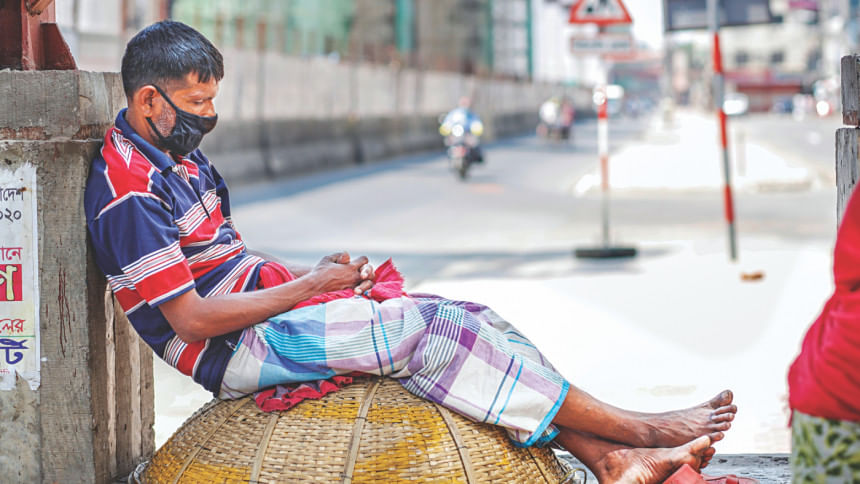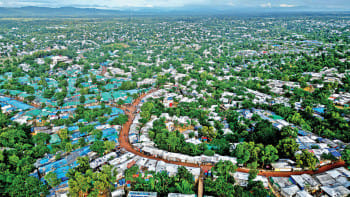The poor looking down the barrel

Over a week into the stay-home order across the country, hungry and half-fed faces have started to grow in a huge number.
With their meagre earnings already spent and the shutdown extended further by a week, 5.17 crore people in the informal sector are now staring down the barrel as the government's promised support for the poor and vulnerable failed to reach many of them.
The government allocation and efforts are also short of requirement and less coordinated, find The Daily Star correspondents talking to the people in need of help, and representatives of local government and local administration of nearly three dozen districts.
Take the example of Harun-ur-Rashid, one of around 4,000 transport workers living in areas adjacent to Sonadanga bus terminal in Khulna. He was yet to get any support till Wednesday.
"Where is my allotted 10kg rice?" asked Harun, who feeds a six-member family, after returning empty-handed from the office of a ward councillor.
"No one came to us to give any assistance until now."
Similar complaints and allegations have been common in the capital, port city Chattogram, divisional cities and other parts of the country where day labourers, rickshaw pullers, transport workers and construction workers are going through hard times.
The Daily Star talked to sufferers, and representatives of local government and local administration of nearly three dozen districts, and found that the government allocation of food falls short of requirement.
The workforce in the informal sector accounts for 85 percent of the total employed population of 6.08 crore, according to the Labour Force Survey 2017 by Bangladesh Bureau of Statistics.
Informal jobs generally lack basic social or legal protections or employment benefits.
Economists say apart from the poor who make up 20.5 percent of the total population of 16.56 crore, the consequences of the ongoing shutdown would be for informal workers, many of whom represent lower income groups.
According to a rough estimate, based on official data of average household size of 4.2 persons, the Covid-19 crisis has put livelihoods and food security of nearly one crore families at stake.
These families were above the national poverty line before the Covid-19 pandemic caused massive disruption to economic activities in Bangladesh. An increase in the number of poor people will erode the gains in poverty reduction that the country achieved over the last three decades.
Yet, the support from the state coffer has been less than the demand for impoverished people, according to our district correspondents.
And amid a cry for food, instances of fraud were found.
Some unknown people distributed slips with the mobile numbers of Zila Parishad (District Council) Member Abul Bashar and Municipality Councillor Jesmin Akhter among needy people in Manikganj, saying food would be distributed among the poor. Dozens went to the spot on Wednesday to get aid but returned empty-handed.
In another case, police arrested a dealer of the food department for selling 1.2 tonnes of rice meant for a government programme in Satkhira's Asashuni area.
Until yesterday, the disaster management and relief ministry gave 48,000 tonnes of rice and Tk 16 crore to local administration, city corporations and municipalities all over the country.
It asked local administration and local government to distribute food and cash among the poor especially beggars, day labourers, rickshaw-pullers, transport and restaurant workers, hawkers and roadside tea sellers.
But there have been complaints of bias and misallocation.
"I have not yet got any support even though I have seen relatively better-off people getting rice," said Khademul Islam, a rickshaw-puller at Chirirbandar in Dinanjpur.
Akram, another rickshaw-puller in the capital's Rayerbazar area, said rice was given mainly to supporters and neighbours of the ward councillor in his area.
Similar complaints were made by rickshaw-puller Habibur Rahman in Mymensingh and slum dwellers in Rajshahi.
In Rajshahi city, most of the 39,077 people in 105 slums were yet to receive government relief.
According to a research of an NGO, some 70 percent of the slum population in the city are out of social safety net.
In Gaibandha's Kuamara, Madarpur and Joypurpara villages, around 1,200 Santal and Bangalee families, most of whom now don't have any work, were still waiting for government help.
Our Chattogram correspondent reported that a good number of people were waiting for relief at an intersection in the city on Wednesday.

Most of them claimed that they did not get any relief for the last 10 days while some others said they had received aid.
"I do not know where to go to get help. No one came to my area to provide any relief," said an elderly Shaheda Begum, a slum dweller in the city's Banglabazar area.
But some were lucky.
Yusuf Mia, who works at a restaurant in Mymensingh city, said he didn't have any work since last week. He got 10kg rice and Tk 500 from the district administration on March 27.
"Things are getting tougher for me as I have to run a five-member family," said Yusuf.
Talking to this newspaper, Mohammad Samir, publicity secretary of construction workers union in Tangail, said, "Construction workers are in hardship."
NOT ENOUGH
Several representatives of local governments said government allocations fall short of requirement.
Sylhet City Mayor Ariful Haque Chowdhury said the government allocated 52 tonnes of rice, which is insufficient to feed more than 2.5 lakh members of 66,000 unprivileged families in the slums.
"We opened a food bank and started distributing food among the poor," he said.
Dhaka South City Corporation (DSCC) Mayor Sayeed Khokon said they are distributing food among 50,000 poor families. Each family gets a packet of essential commodities, including 10kg rice.
He, however, said it's not enough. The DSCC is providing food to 500 families in each ward, but in some wards, 1,200 to 1,600 families need aid.
Khulna City Corporation Mayor Talukder Abdul Khaleque does not see any shortage of allocation. The KCC provides essentials, including pulse and edible oil, to 9,300 families.
He also plans to issue cards to 24,000 poor people so that they can buy rice and flour at subsidised rates under the food ministry's special Open Market Sales (OMS) scheme. Rice will be sold for Tk 10 a kg under the scheme.
The OMS operation is expected to start on Sunday. Five kg of rice will be sold to an individual provided he or she shows national identity card, said a food ministry official.
The ministry, under its "Khaddo Bandhob Karmasuchi", will also continue to sell rice to 50 lakh beneficiaries. Each of them will be able to buy 10kg rice for Tk 10 a kg every month, said the official.
The disaster management and relief ministry also sought allocation of three lakh tonnes of rice and Tk 50 crore from the finance ministry to feed the poor, said officials of the ministry.
Md Shah Kamal, senior secretary of the ministry, said his office got the finance ministry's consent to the allocation of Tk 30 crore.
"And we will get the allocation of rice on Sunday."
Asked for how long the ministry will continue its distribution programme, he said, "The government has enough stock of rice. There won't be any problem."
Replying to a query, he said it is difficult to say how many people have got the government support so far.
"We have a target to reach three crore poor people…'
On complaints that many people have not yet received any aid, he said relief materials are at the disposal of deputy commissioners across the country.
"It is a matter of demand and supply. We say we have enough supply. But it may be that those who are getting 10kg rice expect to get 20kg."
On complaints of irregularities, he said the ministry would take action if there is any specific complaints.
Economist Zahid Hussain said that when staying home and away from work is the only known way to slow the spread of the virus, income replacement measures from the government and community organisations are critical for informal workers and their families to survive this horrific health shock.
"Such measures must go beyond targeting the very poor and the unemployed to include workers in vulnerable occupations. The government has announced free food, medicine and housing for the poor. It will be critical to make sure these reach the working classes, the urban poor and migrant laborers who make the economy tick in normal times."
"The best way to find practical and appropriate interventions is for national and local leaders and decision-makers to work together on a coordinated disaster response involving grassroots community organisations and associations," he noted.
Some 55.5 percent or 8.80 crore of the country's population having daily income from $1.90 to $3.8 belong to the vulnerable group, Research Director of the Centre for Policy Dialogue Khondaker Golam Moazzem said, citing a World Bank estimate.
"This section of population who had a reliable source of income will be more or less affected because of lack of jobs and income. Moreover, their limited savings provide less risk-coping capacity under a situation of absence of job or income for a prolonged period due to coronavirus-elated shutdown."
"Economic condition of this section of people, in general, will deteriorate, and a section of them will fall below the poverty line unless they are protected," he said.
(The Daily Star senior staff correspondent Helemul Alam and correspondents from Manikganj, Mymensingh, Kishoreganj, Jamalpur, Netrakona, Sherpur, Tangail, Sylhet, Habiganj, Sunamganj, Moulvibazar, Chattogram, Noakhali, Rajshahi, Bogura, Gaibandha, Dinajpur, Rangpur, Lalmonirhat, Nilphamari, Pabna, Thakurgaon, Chapainawabganj, Khulna, Bagerhat, Satkhira, Kushtia, Meherpur, Chuadanga, Jashore, Patuakhali, Barishal, Bhola, Jhalakathi and Pirojpur contributed to this report)

 For all latest news, follow The Daily Star's Google News channel.
For all latest news, follow The Daily Star's Google News channel. 



Comments